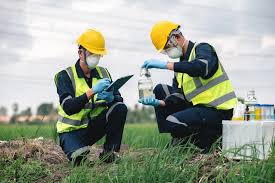Construction waste management in best environmental consulting firm Egypt has become a crucial issue in recent years as the country continues to see a rapid increase in construction activities. With the rising concerns about environmental sustainability, it has become imperative to find an efficient and sustainable solution for managing construction waste in Egypt. This paper aims to explore the current status of construction waste management in Egypt and propose potential sustainable solutions to address this pressing issue. By examining the challenges and opportunities in construction waste management in Egypt, this paper seeks to provide insights and recommendations for a more efficient and sustainable approach to handling construction waste in the country.
Efficient Construction Waste Management in Egypt: A Sustainable Solution discusses the issue of construction waste in Egypt and proposes sustainable alexandria environmental consultancy solutions for management. It examines the current challenges and problems associated with construction waste in Egypt and provides recommendations for effective waste management practices. This paper explores the potential for recycling and reusing construction waste to minimize its environmental impact and promote sustainability in the construction industry. It also offers insights into the economic and environmental benefits of implementing efficient construction waste management practices in Egypt.
Challenges of construction waste management in Egypt

Challenges of construction waste management in Egypt include inadequate regulations and enforcement, limited public awareness and education on waste separation and recycling, lack of proper infrastructure for waste environmental consultant sorted and disposal, and the prevalence of illegal dumping. Additionally, there is a lack of incentives for construction companies to adopt sustainable waste management practices, and limited financial resources for investment in more efficient waste management technologies and facilities.
Egypt's efforts in sustainable construction waste management

Egypt has been making significant efforts in sustainable construction waste management in recent years. The government has implemented stricter regulations and policies to promote the reduction, reuse, and recycling of construction waste. Additionally, there has been an increased focus on promoting sustainable construction practices and using eco-friendly materials. One prominent initiative in Egypt is the National Strategy for Sustainable Management of Construction and Demolition Waste, which aims to increase recycling rates and reduce the amount of waste sent to landfills. The strategy includes measures to encourage the use of recycled materials in construction projects and to improve waste separation and collection systems. Furthermore, there has been a growing emphasis on raising awareness and educating construction companies, contractors, and workers about the importance of sustainable waste management practices. Training programs and workshops have been conducted to promote best practices and technologies for reducing construction waste and minimizing its environmental impact. Overall, Egypt's efforts in sustainable construction waste management are indicative of a broader commitment to promoting environmental sustainability and resource efficiency in the construction industry. These initiatives are essential for mitigating the environmental impact of construction activities and advancing towards a more circular economy.
The economic impact of construction waste in Egypt

Construction waste in Egypt has a significant economic impact as it contributes to higher construction costs, increased disposal fees, and potential environmental fines. The improper disposal of construction waste also hinders the efficient use of resources and limits the potential for recycling and reusing materials. Additionally, the presence of construction waste in urban areas can lead to decreased property values and aesthetics, affecting overall economic development. Therefore, addressing the economic impact of construction waste is crucial for sustainable development in Egypt.
Innovative solutions for construction waste in Egypt

Innovative solutions for construction waste in Egypt include the use of sustainable materials, prefabrication, and modular construction techniques to minimize waste generation. Additionally, recycling and reusing construction waste materials such as concrete, metal, and wood can help reduce the environmental impact of construction projects. Furthermore, implementing waste management plans and promoting the use of advanced technologies for waste sorting and disposal can also contribute to more sustainable construction practices in Egypt.
Regulatory framework for construction waste management in Egypt
The regulatory framework for construction waste management in Egypt is established primarily through the Environmental Law No.4 of 1994. This law provides guidelines for proper waste management and disposal, including construction waste. The Ministry of Environment and other relevant authorities are responsible for enforcing these regulations and ensuring compliance within the construction industry. Additionally, the Egyptian Environmental Affairs Agency (EEAA) has also developed specific guidelines and standards for the management of construction waste, including recycling and reuse practices. Violations of these regulations can result in penalties and fines for non-compliant parties. Overall, the regulatory framework aims to promote sustainable construction practices and minimize the environmental impact of construction waste in Egypt.
The environmental consequences of construction waste in Egypt
Construction waste in Egypt has significant environmental consequences. Improper disposal of construction waste leads to pollution of air, water, and soil. This can result in the release of hazardous chemicals and materials into the environment, posing a threat to public health and ecosystems. Additionally, the accumulation of construction waste can contribute to the depletion of natural resources and exacerbate land degradation. Effective management and recycling of construction waste are imperative to mitigate these environmental impacts.
Community involvement in construction waste management in Egypt
environmental consulting firms
Community involvement in construction waste management in Egypt is crucial for promoting sustainable practices and reducing environmental impact. One example of community involvement is the establishment of recycling programs in local neighborhoods, where residents are encouraged to segregate their waste and participate in recycling initiatives. Additionally, community awareness campaigns and educational programs are organized to inform and educate the public about the importance of proper waste management. Furthermore, collaboration between local government agencies, non-profit organizations, and community groups play a significant role in implementing effective waste management strategies and promoting a culture of environmental responsibility. By involving the community in construction waste management, Egypt can work towards achieving its sustainability goals and reducing the environmental burden of construction activities.
In conclusion, efficient construction waste management in Egypt offers a sustainable solution to the environmental challenges posed by the construction industry. By implementing better waste management practices, such as recycling and proper disposal, Egypt can decrease its environmental impact and contribute to a more sustainable future for the country. It is crucial for the government and construction industry stakeholders to prioritize and invest in construction waste management Egypt to ensure a cleaner and healthier environment for current and future generations.
environmental consulting firms
